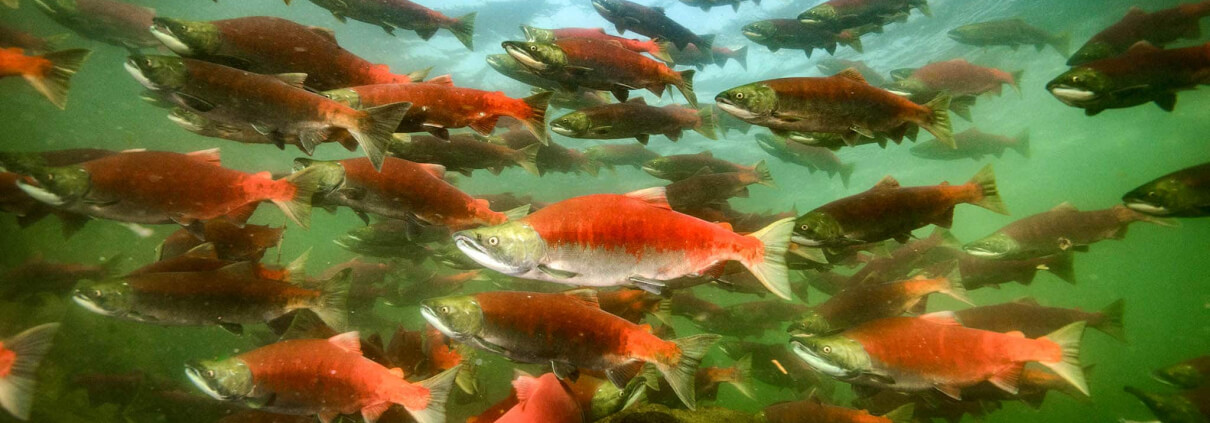PSF Biologist Position
The Pacific Salmon Foundation is currently hiring for a Biologist Position to collaborate with PSF staff and DFO on a funded science based review of Pacific salmon hatchery results in the Pacific region.
This job application closed on March 15, 2020. Follow us on social media to get notified about new opportunities
Job Description
Position Identification
Title: Biologist
Status and Funding: Full-time; grant funded
Position Overview
The Biologist will collaborate with other PSF staff and contractors in relation to a Department of Fisheries & Oceans (DFO) funded science-based review of Pacific salmon hatchery results in the Pacific region. The objective will be to complete a full review of Pacific salmon hatchery practices and production, and to quantify hatchery effectiveness over time.
Roles and Responsibilities
The Biologist’s key areas of responsibility will include:
a. Develop an analytical framework that allows for analysis of juvenile production, estimation of survival rates by release groups, and production of adults by release group, facility, and return years.
b. Working with a PSF Analyst, determine production (numbers of fish and rate of production) by spatial (location and location/facility), temporal, and regional strata; and evaluate the bases for variation in production between these strata.
c. Evaluate effectiveness for each facility type (major, community, PIP, spawning channels). This assessment would examine the basic survival rates and abundance of salmon produced by facilities over time. This would include the following assessments:
- Assessment of enhancement contributions by time/space. This would integrate hatchery production by facility with spawning escapement data by stream/year (using the Pacific Salmon Explorer database and other sources). The objective of this analysis is to examine interactions between wild fish and hatchery production and to see if it is possible to detect effects on natural populations, at varying spatial distances, as a result of interactions with enhanced production.
d. Examination of changes in biological traits in enhanced populations (age, size @ age, size @ age, etc) and where possible compare trends with natural populations.
e. Assess of the role of community-based and production (satellite) hatcheries to support rebuilding local salmon populations;
f. Assess the utility of stream and larger-lake enrichment, and the utility of sea pen releases of enhanced salmon production.
g. Other factors that may come forward through the course of this study.
h. Meetings with SEP, PSF biologists and Hatchery staff and managers as necessary to collate other sources of information;
i. Write up of analytical results (provided by analyst);
j. Write up of the Effectiveness Review;
k. Development of a deliberate and long-term monitoring framework for effectiveness monitoring; and
l. Other duties as required.
Exercising Judgment/Impact of Decisions
The Biologist will exercise independent judgment and take initiative while performing their duties. The Biologist will be accountable for the effective execution of assigned duties which is critical to the success of the PSF. The Biologist interacts with varying levels of staff, consultants and other stakeholders. Errors or lapses in judgment will adversely impact the reputation and efficiency of the PSF.
Reporting and Supervision
Supervised by Dr. Isobel Pearsall and Dr. Brian Riddell, the Biologist is responsible for undertaking all work identified by them and meeting or exceeding the standard of care set by them.
Qualifications
- An MSc in a related biological field or an equivalent combination of education and experience is required. At least two years of relevant research experience is essential. Essential competencies include: strong analytical skills with a background in statistics and familiarity with coding; ability to build and analyze large datasets; ability to draw inferences from results and to prepare reports (verbal and written) of these results. Familiarity and understanding of the BC Salmon Enhancement Program would be beneficial.
- Exceptional verbal and written communications skills; an ability to communicate to a wide variety of audiences in several different mediums; the ability to work effectively under pressure and to meet deadlines; the ability to work independently and within a team environment and to demonstrate a high degree of initiative; the ability to exercise tact, discretion, diplomacy and maintain confidentiality.
Mentoring and Development
The PSF is committed to life-long learning for all team members. Ongoing mentoring will be available to facilitate the Biologists career development and appropriate training and skill-building opportunities will be provided. Educational opportunities will be encouraged.
Organizational Summary
The Pacific Salmon Foundation (PSF), founded in 1987, is a federally incorporated non-profit charitable organization dedicated to the conservation and restoration of wild Pacific salmon and their natural habitats in British Columbia and the Yukon. Operating independently from government, PSF facilitates dialogue and undertakes positive initiatives in support of Pacific salmon amongst all levels of government including First Nations; as well as industry, communities, individual volunteers and all fishing interests.



